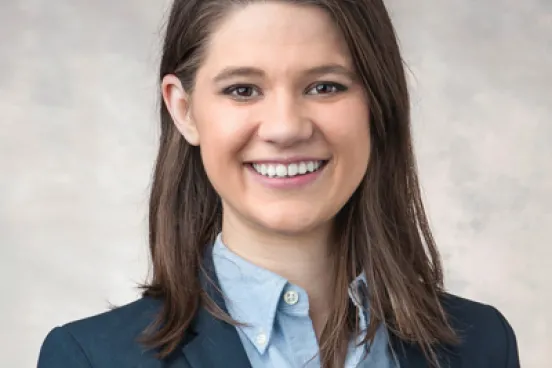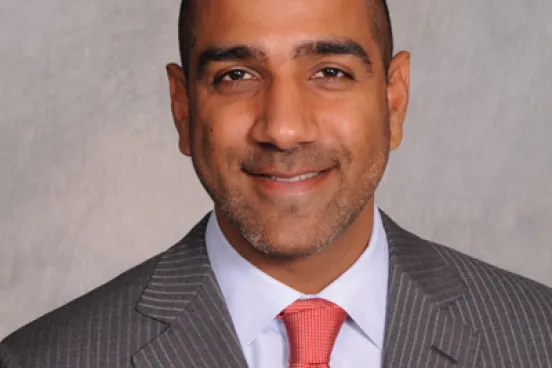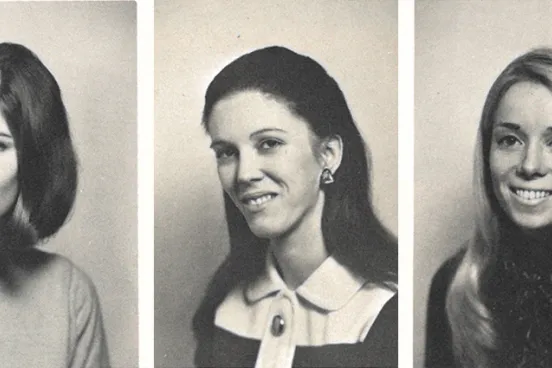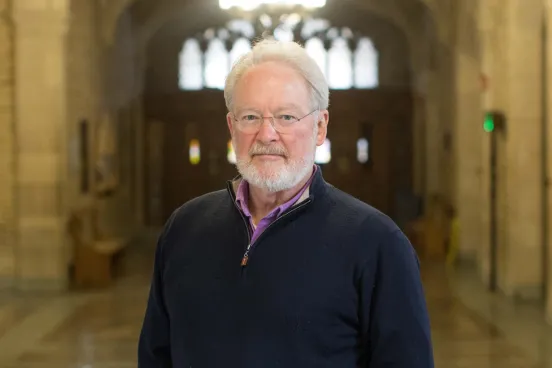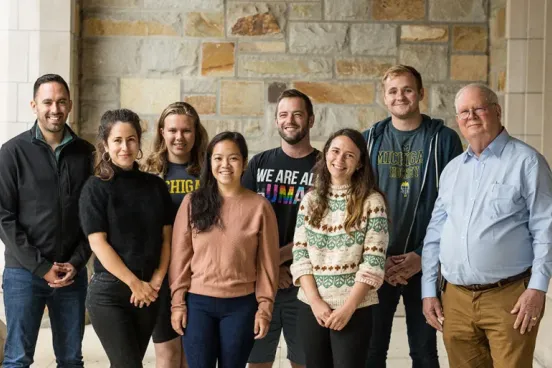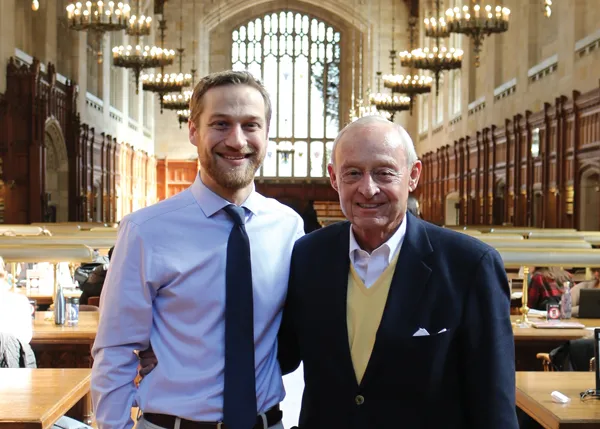
John Boyles, ’59, is retired from active practice but continues to consult for the Grand Rapids, Michigan, office of Verspoor Waalkes PC, where he served as counsel for many years. As a 2L, Boyles, who also earned a BBA at Michigan, became owner and operator of his family’s business—the Mr. Fables restaurant chain—when his father died. By the time the chain was sold in 1988, there were 17 Mr. Fables restaurants in West Michigan. Boyles later developed a commercial real estate development company and served on the board of directors for the Old Kent Financial Corporation (now Fifth Third Bank), including several years as chair of its audit committee. Boyles was sworn into the U.S. Supreme Court Bar by Chief Justice John Roberts Jr. in 2015.
Paul Hoversten, ’18, is from Two Rivers, Wisconsin. After graduating from Martin Luther College in New Ulm, Minnesota, he moved to Colorado, where he received a master’s degree in linguistically diverse education at the University of Colorado Boulder and taught a bilingual third-grade classroom. Hoversten came to Michigan Law to pursue an interest in the intersection of law and education, which quickly evolved into a passion for civil litigation, particularly international and regulatory disputes. He was one of six note editors for the Michigan Law Review, a student-attorney in the Child Welfare Appellate Clinic, and a member of T.J. Hooper and the Learned Hands—a Law School rock band launched in the 1980s. As a 1L, Hoversten interned at the U.S. Department of Education in Denver and, as a 2L, at the U.S. Department of Justice. In the fall, he will clerk for The Hon. Benita Pearson of the U.S. District Court for the Northern District of Ohio.
Why did you want to go to law school, and why did you choose Michigan?
John: I wanted to be a lawyer since I was a young boy and enjoyed history and civics courses throughout school. I knew in my heart that I wanted to practice law in Grand Rapids, where I was born and raised. I knew some of the local lawyers because they were friends with my family. Many of those lawyers in the early 1950s went to Michigan Law. They were the best lawyers in town, and I wanted to emulate that, so I figured that I should attend the Law School, too.
Paul: I did not always know that I wanted to be a lawyer; I was a teacher before I started at the Law School. I taught literacy and math, but my favorite thing to teach, and the most gratifying, was English: how to use it to your advantage, how to affect others with it, and how to affect your own life with it. I don’t think it’s a commonly understood notion that the practice of law is about the use of language. It became clear to me over the course of time, and I decided that was how I wanted to use it in my life and career.
What was your favorite class?
Your favorite professor?
John: My favorite class was Constitutional Law. It was taught by Professor Paul Kauper, who was one of the greatest constitutional law instructors in the whole country. It was fascinating how much he could pull from a case and how important those cases were to the founding of our country and our legal system. I loved it.
Paul: The very first class I ever walked into at the Law School was Legislation and Regulation. I’m not sure if it was based on the content or the delivery—it was taught by Professor Julian Davis Mortenson, who is an incredible teacher—but it drew me in. It was the first time in law school, and maybe in life, that I really examined my intuition about the law, society, and how government works. I examined it on a much deeper level than I had before. That experience was brand-new to me and really exciting.
Where was the best place to study when you were in law school?
John: Janet Boyles, BSN ’58, and I studied in the Reading Room every Friday night—it was our date night. I am still taken aback when I walk through the library. We have three children and seven grandchildren, and we have taken them all through the Reading Room, so they can experience what it is all about.
Paul: The best place to study is in the Upper Commons [the main level of the Robert B. Aikens Commons]. The windows overhead make it feel like you’re outside. When it snows, it feels like you’re inside a snow globe.
How has your time at Michigan Law helped you grow?
John: I attended the U-M Ross School of Business and learned the mechanics of accounting and marketing. At the Law School, I learned how to think—how to analyze situations and come to a decision that makes sense. It was a great combination, particularly because my way of thinking helped tremendously in my business career. When I began practicing in Grand Rapids, several local businesses came to me with their legal problems because of my dual background, and I was actually operating a successful business.
Paul: The way I think is more out loud and in-depth. When I am presented a problem, I now get down to the nitty-gritty details of an issue before proposing a solution. Even in everyday conversation with my family and friends, it is common for me to examine situations far past where I normally would have stopped before attending law school.
How has your Michigan Law education opened doors for you?
John: I thought I would have to drop out of law school when my father died. My mother was an unexpected widow, and I had two younger sisters. Janet and I had been married for only six weeks. Dropping out was the easiest thing to do. When I told Roy Proffitt, ’48, LLM ’56, the dean of students at that time, of my decision, he said, “Don’t make that decision until you come back to see me in a week. In the meantime, I will meet with Dean [E. Blythe] Stason.” I came back a week later, and he told me of his plan. “If you can do this for the next two years,” he said, “you will graduate from the Law School.” I went to school Monday, Tuesday, and Wednesday. I traveled to Grand Rapids every Wednesday afternoon and returned Sunday evening ready to do it all again. I attended two summer school sessions but graduated in September 1959. I am forever indebted to Dean Proffitt and the Law School for making this possible and for changing my life in a very positive way.
Paul: I will be clerking for The Hon. Benita Pearson, and it’s entirely a credit to the Law School and its offerings. I have taken courses across the spectrum. I was a student-attorney in the Child Welfare Appellate Clinic, and I have participated in numerous student organizations. There is a wealth of opportunity here at the Law School. The breadth of experience, academically and otherwise, that I gained here has prepared me well for all kinds of work. It has been truly incredible.
What does the John Duvall Boyles Scholarship mean to you?
John: Michigan Law is very special to me. I have often thought about what my life would have been if not for Dean Proffitt—it could have taken a very different turn. I am indebted to the Law School and do my best to give back, which is one of the reasons why Janet and I established this scholarship. Also, for Janet and me, it is very energizing to meet our scholarship recipients. Every time we interact with these young students, it gives us faith that the country will be in good hands and that the future looks bright. We know that this endowment and the Law School will go on long after we are gone.
Paul: It means that I get to be one link in a long chain of generosity and opportunity. Right now, I get to see one link of it—John and Janet, and me. Eventually, I’ll get to see more when I take their place and help, in any way I can, a future student of the Law School. However, it’s not just those two or three links that I participate in. The chain extends beyond even John and his experience, to generations before him. I am certain that it will go on generations after me. It is a long chain, and I am blessed to be in the middle.



